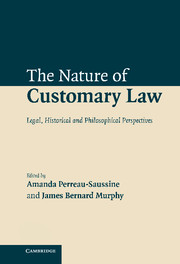Book contents
- Frontmatter
- Contents
- List of contributors
- Table of cases
- The character of customary law: an introduction
- Part I Custom and morality: natural law, customary law and ius gentium
- Part 2 Custom and law: custom, common law and customary international law
- 7 Custom in medieval law
- 8 Siege warfare in the Early Modern Age: a study on the customary laws of war
- 9 The idea of common law as custom
- 10 Three ways of writing a treatise on public international law: textbooks and the nature of customary international law
- 11 Custom, common law reasoning and the law of nations in the nineteenth century
- 12 Custom in international law: a normative practice account
- 13 Customary international law and the quest for global justice
- Index of names
12 - Custom in international law: a normative practice account
Published online by Cambridge University Press: 30 June 2009
- Frontmatter
- Contents
- List of contributors
- Table of cases
- The character of customary law: an introduction
- Part I Custom and morality: natural law, customary law and ius gentium
- Part 2 Custom and law: custom, common law and customary international law
- 7 Custom in medieval law
- 8 Siege warfare in the Early Modern Age: a study on the customary laws of war
- 9 The idea of common law as custom
- 10 Three ways of writing a treatise on public international law: textbooks and the nature of customary international law
- 11 Custom, common law reasoning and the law of nations in the nineteenth century
- 12 Custom in international law: a normative practice account
- 13 Customary international law and the quest for global justice
- Index of names
Summary
A troubled concept
“Custom is not a special department or area of public international law: it is international law.” So writes Ian Brownlie; yet, writers on international law now widely declare customary international law to be dead or at least in mortal crisis. Such disputes over its viability, of course, stem from differences of political principle and partisan geopolitics, but they also stem from genuine confusion about the nature of custom and its role in the international legal order.
For example, according to the International Court of Justice, it is “axiomatic” in international law jurisprudence that customary international law is found “primarily in the actual practice and opinio juris of States.” To determine whether legally recognized custom exists on some matter, the Court added later:
[n]ot only must the acts concerned amount to a settled practice, but they must also be such, or be carried out in such a way, as to be evidence of a belief that this practice is rendered obligatory by the existence of a rule of law requiring it … The States concerned must therefore feel that they are conforming to what amounts to a legal obligation.
What is here said to be axiomatic in international law jurisprudence is the familiar additive understanding of custom: custom is analyzed into behavior or usage (usus) plus belief or conviction of (legal) necessity (opinio juris sive necessitatis).
- Type
- Chapter
- Information
- The Nature of Customary LawLegal, Historical and Philosophical Perspectives, pp. 279 - 306Publisher: Cambridge University PressPrint publication year: 2007
- 8
- Cited by

